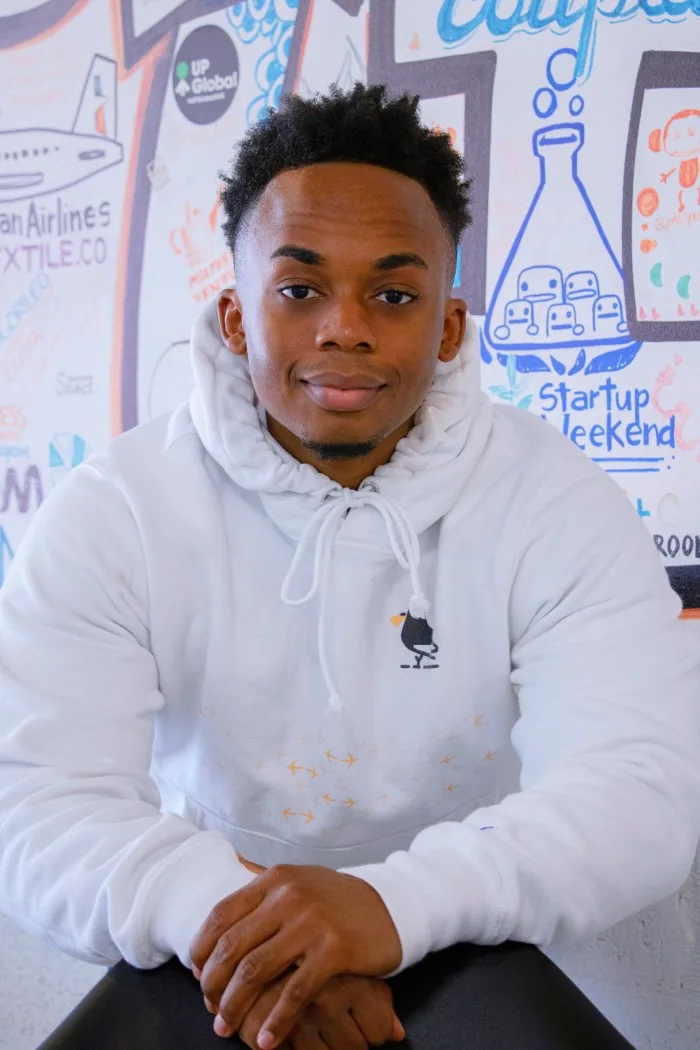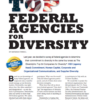Carini Banks grow up poor in Indianapolis in a family that included two younger brothers and a single mom. So did everyone else he knew. So when he finally got a good job, he was confronted with the reality that many of the people he loved were still struggling and wanted him to give them money.
Fifteen to 20 times a month, relatives hit up Banks for cash. Some ask for a few dollars, while others request $100 or more. Normally a free spirit, Banks, 25, has become dour about the frequent requests.
“It could be the same cousin that will ask me every day of the week,” he said. “And it’s just completely insane to me to think that it’s OK to ask me because of the fact that we are family, and the thing is I know they wouldn’t ask someone who isn’t family.”
Just a few weeks ago, he reconnected with a half-sister after many years of estrangement.
“She had just had a baby and, in the first conversation, she’s asking for money,” he said. “In my head, I’m thinking, ‘I didn’t have this child.’ I understand that it’s my sister and she needs it, but if I do this once, she’ll come back again and think that she can come to me for money anytime.”
Borrowing money from relatives is common in just about all cultures and racial groups in America. But Black people tend to have a greater need for a loan when the economy is not doing well, like during the coronavirus pandemic. Inflation peaked at 9.1% in June 2022, the highest rate in 40 years, and the Federal Reserve has raised interest rates 11 times in the last 18 months.

J’Lyn Smith
“When you look at where the jobs were lost during the pandemic, for those who were laid off first, they tend to be women and African Americans because they were in the service industry jobs, lower-paid jobs, retail jobs,” said Michelle Singletary, a personal finance columnist for The Washington Post. “So we got hit first and who’s the last to recover? We are the last to recover.
“With anything, when it comes to the Black community, whenever there is a problem in the economy, when the rest of America gets a cold, we get pneumonia,” Singletary said. “And it’s not an excuse for people who don’t have personal responsibility, but historically, we are underpaid. Historically, we are discriminated against in jobs. Historically, we are redlined.”
These economic headwinds have led Black consumers disproportionately searching for capital beyond the mainstream financial system, such as pawn shops, payday and auto-title loan companies – and family.
“You’re going to a payday lender because inflation is making more it difficult to pay for groceries and you’ve got a liquidity gap between your paydays,” said Anthony Barr, research and impact director of the National Bankers Association in Washington. “You’re going because your car broke down and you can’t get a consumer lending loan from a bank. And so you’re forced to go to a predatory institution to get access to that credit.”
A higher portion of Black families seek help from relatives who, like Banks, have a more favorable financial picture.
More than 27 million Americans reported receiving funds from friends or family this summer, according to the U.S. Census Bureau Household Pulse Survey. In the two-week period ending Sept. 4, 18% of Black adults reported borrowing from friends or family, compared to 15% for Hispanics, 8% for whites and 7% for Asians.
This is just one aspect of the huge wealth gap between the white community and the Black community. It stands at 8-to-1, according to multiple studies, including this recent one from the Rand Corp.
“Our existence has long been characterized by the proverbial being Black but feeling blue,” said Don Owens, a vice president with Prosperity Now, an economic justice advocacy organization. “If you were to ask me what grade would I give America for efforts to address the issue on debt in the Black community, the best we could say is that it needs improvement. And the worst we could say is that we’re failing.
“We want an economy that’s just. We want an economy that’s fair. And we want an economy that’s free from structural racism,” Owens said. “We truly believe that this is the next step continuing the fight and the work of the Civil Rights Movement from the 1950s, ’60s and ’70s. It’s the unaccomplished part of the work that Dr. King talked about before he was murdered, closing the wealth divide in this country and creating true prosperity.”
“Black people have always been generous and resourceful when it comes to helping a family member in need,” said Barr, who is 28 and has loaned money to relatives. “But it’s limited, right? It’s like you can only do so much with income when you don’t have generational wealth to draw from.”
Carini Banks had always dreamed of joining the Army to better himself. After high school, he enlisted and wound up in South Korea as a human resources specialist. He was promoted several times, making it to the rank of private first class in his first year and half.
“I was able to look in the mirror and figure out who I was as a man,” he said.
But in 2018, he was diagnosed with ulcerative colitis, a chronic inflammatory bowel disease, and was discharged with a disability pension of roughly $3,000 a month. He got a series of entry-level positions at Finish Line, Target and Lowe’s. People started coming to him for loans, anywhere from $10 to $100 at a time.
More than anything, he wanted to help his two younger brothers, Cameron and Desmond, find their way out of poverty like he was doing for himself.
Unlike Banks, Michele Howard-Mitchell grew up middle class in Ohio and moved to Georgia after marrying an Atlanta lawyer, settling in as the office administrator for his law practice. Still, their professional status didn’t shield them from relatives and other people asking for money when things got tight.
Howard-Mitchell’s husband, Albert A. Mitchell, had advice for those seeking money: “He says go to my wife,” she said.
Over the decades, plenty of folks behind on their rent and car payments or faced with unexpected repair bills called on the Mitchells. Howard-Mitchell, 67, estimated they have doled out more than $500,000, maybe as much as $1 million, lending out $15,000 to $20,000 in any given year and rarely being repaid.
“If I had all the money we’ve given out right now, we would be beyond millionaires,” Howard-Mitchell said. But she has no regrets.
“It’s hard to see those that you love out there suffering or not being able to make it,” Howard-Mitchell said. “It’s hard to just turn your back on them. How could you tell them no, especially when they’re of your DNA?”
Albert Mitchell is turning 70 and has had heart problems, including triple-bypass surgery in 2009. Howard-Mitchell would like to close down the law office and travel more, although her husband hasn’t agreed yet.
“I have money saved away, and not really to give to people,” she said. “You get to the point where you start making that column: Who can I help? What can I do? So then you get to a point where you realize that you can’t save everybody.”
She recounted one recent encounter when she believed she had to turn someone down.
“I just had somebody call and say, ‘Hey, my house is in foreclosure. I want to know if you and Mitch can help me out. I’ll get it back to you.’ ”
The friend needed $8,500 but had recently gone on a vacation abroad.
Howard-Mitchell said she asked, “Didn’t you just come back from Dubai?”
Someone else paid for her ticket, the woman responded.
“I don’t give a darn who paid for your ticket,” Howard-Mitchell said. “You knew when you left that you were almost three months behind on your mortgage. I told her, ‘No, I’m not going to be able to do that. I’m not even going to ask my husband.’ ”
Singletary, the columnist, said that, as painful and awkward as it feels, sometimes no is the right answer.
“If somebody’s coming to you for money, you ought to kind of figure out what’s going on,” she said. “Now sometimes people get into situations through no fault of their own. They lose a job or they get laid off. Maybe the hours that they used to have are not there. They’re trying. Then you do what you can to help them.
“And there’s some relatives who just aren’t doing what they’re supposed to do. And then those are the tough nos. And you have to say no, because the thing is you don’t want to enable bad behavior. And you also step in the way of their growth. Because if you are always bailing them out and they never try to figure out how to do this on their own, then they will never grow and they will always have their hand in your pocket and you don’t want that.”
But she acknowledges “It is tough to say no, especially if it’s your mom or your dad or close cousin or someone you might’ve grown up with and they’re like, ‘Oh, can you help me out?’ You have to stand sturdy because if you don’t, you’ll bring yourself down.”
“When am I going to get paid back?”
“How much money do you need?”
“What are your feelings about including an interest rate?”
“How do I prove I repaid all my debt?”
Brian Bristol, 26, is a software engineer and wants to take the mystery out of the questions about loans between family members or friends.
He co-founded Pigeon Loans, a platform that allows friends, family and others to lend money to each other. His idea originated a few months into the pandemic in 2020, he said, after his mom needed a few loans after being downsized from her job as a graphic designer.

Brian Bristol
“I was in one of those situations where I said, ‘Hey, I can certainly help, and I will help. But at some point, I may need this back because I’m starting my own career,’ ” Bristol recalled.
He had always admired how his mom had raised him and his younger sister by herself.
“We didn’t have too many means growing up,” said Bristol. “Like, it was always a thing to ask for money from friends and family to make it through to the next paycheck because you never knew when food was going to get on the table.”
After graduating from David. W. Butler High School near Charlotte, North Carolina, where he was a standout in the classroom and an All-State lacrosse player, Bristol attended Bowdoin College, in Brunswick, Maine. There, he learned to analyze and develop algorithms.
After college, he worked at Intuit and helped spearhead software engineering initiatives. “I learned how to problem-solve,” he recalled.
He drew up a multiyear repayment plan for his mother, and got busy creating Pigeon, a service that allows subscribers using the app to make loans while keeping track of IOUs, setting up payment schedules and sending automatic reminders.
“In this whole journey, I’ve just been learning how can I create and innovate in a way that helps others because that’s what I find pride and joy in doing,” Bristol told me during an interview via Zoom. “I enjoy building things, but building things with a purpose and building things that can help others.”
During an interview in August, Bristol said that Pigeon had 24,000 subscribers in the U.S. and has already facilitated $5 million in loans this year, with the average transaction of $8,000 to be paid back over two years, Bristol says.
Low-income people make up about half of Pigeon’s business and Black folks represent about 20%.
“People use it for businesses,” he said. “People use it for emergencies. They use it for home mortgages.
“If you come to us at Pigeon, we don’t want you to think that you have to move money or ask for money in a very specific way,” Bristol said. “So when Black Americans or even just minorities or low-income people in general come to us, they’re often like, ‘Hey, I need this $2,000, but I know I can’t pay this back for a year, or I can’t pay it back for two years,’ as opposed to some traditional loans that are like, ‘Hey, you got 30 days and you gotta start paying it back.’ ”
The company currently doesn’t charge to facilitate loans under $10,000, although users are responsible for fees charged by a payment processor (e.g., if they elect to use a credit card). The company doesn’t lend money itself and therefore isn’t subject to regulations governing bank loans, Bristol said.
Pigeon has broadened beyond just helping friends and family loan and borrow money from one another. Bristol cited a group of female investors that is using Pigeon to help Black women in an effort they call Level.
“They primarily help African American women create businesses in the United States and get to a level of scale that they can’t necessarily get to without infusions of capital,” Bristol said. “If you’ve seen in the venture capital world or even the private equity world, our [Black] businesses are just not funded. It’s really hard to get funded. And when those businesses come around that are actually good, they’re often looking for unique sources of funding. So Level is one of those that is used in Pigeon to actually create consortiums of people that have allowed them to then fund these businesses and get their next levels of success.”
It turns out that Banks wasn’t able to keep his brothers on the right path.
Earlier this spring, Cameron, now 22, and Desmond, 20, were each convicted of four counts of murder, felony murder and robbery for their part in a robbery and shooting that left four other young people dead in Indianapolis in February 2020. Police arrested Cameron in a grocery-store parking lot nine days after the murders. He was riding in the car with Banks.
“And all I remember is them just coming to grab my brother, putting cuffs on his arms and on his legs, and then seeing him taken him away,” Banks told me. “We just looked at each other, and I just felt so helpless.”
The brothers were each sentenced to 220 years in prison, according to local news reports. A third participant was found guilty on the same charges and sentenced to 240 years in prison. A fourth man, the getaway driver, cooperated with authorities and is awaiting sentencing on lesser charges.
Now, Banks has one more financial responsibility since he vowed to support his siblings through their prison sentences and pays for clothing, care packages, phone calls and other expenses.
“Those are my brothers and I love them dearly, and I just know that I have to take care of them for the rest of my life,” Banks said.
But his brothers’ fate has not stopped other relatives from coming to him for money.
“Recently, one of my cousins asked me for some money and I just straight up laid out my bills,” Banks said. “ ‘This is how much I spend on my credit cards every month. This is how much I spend on my car insurance. This is how much my car payment is.’ I just laid it out in front of her and she hasn’t asked me for anything since.
“So it may not be the best way, but it allows people to understand my money goes to somewhere. I don’t just have it to give to you.”



